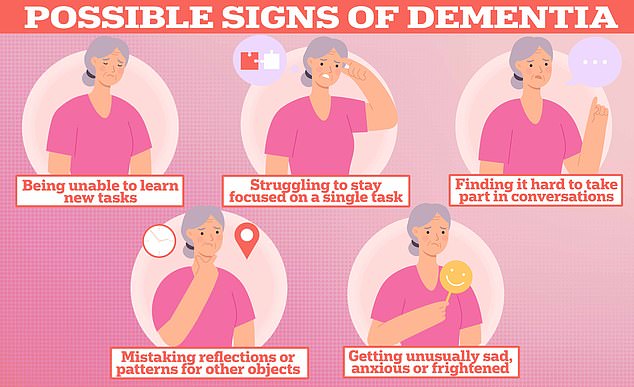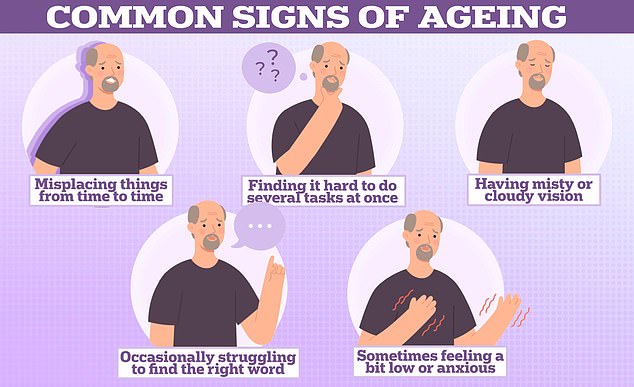Revealed: 40% of Brits have NO idea that leading cause of death can even kill…
It is Britain’s biggest killer, claiming the lives of around 74,000 Britons every year.
But 40 percent of people have no idea that dementia can be fatal, a poll shows.
Memory loss, slow thinking and difficulty concentrating are common signs of the disease, which is often wrongly thought to be a natural part of aging.
But as dementia progresses, parts of the brain that control vital functions, such as swallowing and breathing, also become damaged.
This means that patients can develop fatal complications, including pneumonia, heart problems and serious infections.

Many people are unaware of the devastation dementia causes, according to an Alzheimer’s Research UK poll of more than 2,500 adults without dementia.

But they can also be a sign of dementia – the memory-robbing disorder that affects almost 1 million Britons and 7 million Americans
But many people are still unaware of the devastation dementia causes.
A survey by Alzheimer’s Research UK of more than 2,500 adults without dementia found that almost half fear developing dementia.
However, only a third of people believe it is possible to reduce the risks of getting it.
This is despite research suggesting that up to four in 10 cases of dementia can be prevented by targeting risk factors such as drinking less alcohol, quitting smoking and tackling hearing loss in middle age.
Maintaining a healthy heart and brain, staying active and being a healthy weight can also reduce risk, studies show.

Memory loss, mixing up words and difficulty concentrating can be a normal part of growing older
The survey also found that more than half of respondents know or have known someone who has been diagnosed with dementia, usually a parent or grandparent.
But Alzheimer’s Research UK found there is still a huge knowledge gap when it comes to dementia.
“It’s shocking that only six in 10 people realize that dementia is a cause of death, despite it being the biggest killer in Britain,” said Samantha Benham-Hermetz, executive director of policy at Alzheimer’s Research UK.
Dementia and Alzheimer’s disease were the leading causes of death in England and Wales in 2022, accounting for 65,967 fatalities – an increase of 4,700 compared to 2021, according to the Office for National Statistics.
Scotland recorded 6,277 deaths and Northern Ireland reported around 2,000.
Women are more likely to develop dementia than men and according to Alzheimer’s Research UK, dementia has been the leading cause of death for women since 2011.
According to the charity, it is estimated that around 944,000 people in Britain are living with dementia.
The term is used to describe the symptoms that occur when there is a decline in brain function. There are many causes, but Alzheimer’s disease is the most common.
Many of the diseases – including vascular dementia and frontotemporal dementia – are linked to an abnormal build-up of proteins in the brain that cause nerve cells to deteriorate and die, causing parts of the brain to shrink.
There is currently no cure for dementia, but medications and therapies can help relieve symptoms.
However, scientists are hopeful that drugs in the pipeline that have been shown to rid the brain of the plaques thought to be responsible for dementia – such as donanemab, lencanemab and remternetug – will prove ‘game-changing’.
About half of adults surveyed by Alzheimer’s Research UK said they were skeptical about the treatments currently available, with many saying they were not affective.
But most (56 percent) believe the diseases that cause dementia will be cured.
‘The treatments have not changed radically for a long time. If I went back to my clinic 20 years ago, it wouldn’t look much different than what it looks like today, both in how we assess dementia and what we can do about it,” said Dr. Ben Underwood , assistant professor of geriatric psychiatry. at the University of Cambridge.
But new developments in dementia treatment could “change the game,” Dr. Underwood added.
He said: ‘To make more progress, we need to involve the whole of society and encourage everyone to take part in research.
‘The more conversation we can have about dementia, the better.’

